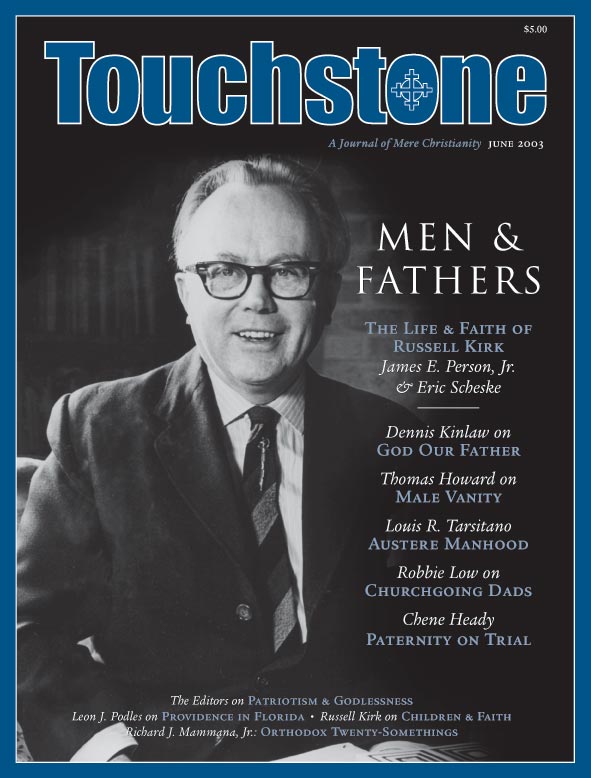Introduction
Like many kids of elementary school age, I was bored in church and I looked forward to the day when I could follow my dad's lead and go golfing on Sunday mornings.
I remember one summer Sunday when my dad put aside his 8:00 AM tee-time to join us in church. I wanted my dad to know that I was on his team and so I whispered in his ear that I wouldn't be going to church when I grew up. He leaned over and whispered a light reprimand: "I hope that's not true."
Feeling a bit abandoned by a man who, after all, spent his Sundays doing what I wanted to do, I whispered back: "well, I'll probably go as much as you do."
In 2003, Robbie Low presented some remarkable numbers on fathers and church-going. Fathers, Low shows, deserve nearly all the credit—and nearly all the blame—when it comes to their childrens' future church attendance (my sisters and I being exceptions to the rule).
"The Truth About Men & Church" has been one of Touchstone's most sought out articles from our archives, perhaps because its relevance seems to grow with each passing year:
The results are shocking, but they should not be surprising. They are about as politically incorrect as it is possible to be; but they simply confirm what psychologists, criminologists, educationalists, and traditional Christians know. You cannot buck the biology of the created order. Father's influence, from the determination of a child's sex by the implantation of his seed to the funerary rites surrounding his passing, is out of all proportion to his allotted, and severely diminished role, in Western liberal society.
I only wish I had this article when I was still in elementary school. I could have easily used it to rob my dad of a few games of golf.
—Douglas Johnson, Executive Editor
(read more Editor's Picks)
The Truth About Men & Church by Robbie Low
View
The Truth About Men & Church
Robbie Low on the Importance of Fathers to Churchgoing
Most of us, I suspect, are not great students of “the small print.” We employ lawyers and accountants because we recognize that carefully constructed small print may contain disclaimers, definitions, and information that effectively drive a coach and horses through our assumptions about the general argument and make utterly null and void the common understanding that we thought we had. Allow me to introduce you to a piece of very small print.
Not many will have whiled away the long winter evenings by reading “The demographic characteristics of the linguistic and religious groups in Switzerland” by Werner Haug and Phillipe Warner of the Federal Statistical Office, Neuchatel. It appears in Volume 2 of Population Studies No. 31, a book titled The Demographic Characteristics of National Minorities in Certain European States, edited by Werner Haug and others, published by the Council of Europe Directorate General III, Social Cohesion, Strasbourg, January 2000. Phew!
All this information is readily obtainable because Switzerland always asks a person’s religion, language, and nationality on its decennial census. Now for the really interesting bit.
The Critical Factor
In 1994 the Swiss carried out an extra survey that the researchers for our masters in Europe (I write from England) were happy to record. The question was asked to determine whether a person’s religion carried through to the next generation, and if so, why, or if not, why not. The result is dynamite. There is one critical factor. It is overwhelming, and it is this: It is the religious practice of the father of the family that, above all, determines the future attendance at or absence from church of the children.
If both father and mother attend regularly, 33 percent of their children will end up as regular churchgoers, and 41 percent will end up attending irregularly. Only a quarter of their children will end up not practicing at all. If the father is irregular and mother regular, only 3 percent of the children will subsequently become regulars themselves, while a further 59 percent will become irregulars. Thirty-eight percent will be lost.

If the father is non-practicing and mother regular, only 2 percent of children will become regular worshippers, and 37 percent will attend irregularly. Over 60 percent of their children will be lost completely to the church.
Let us look at the figures the other way round. What happens if the father is regular but the mother irregular or non-practicing? Extraordinarily, the percentage of children becoming regular goes up from 33 percent to 38 percent with the irregular mother and to 44 percent with the non-practicing, as if loyalty to father’s commitment grows in proportion to mother’s laxity, indifference, or hostility.
Before mothers despair, there is some consolation for faithful moms. Where the mother is less regular than the father but attends occasionally, her presence ensures that only a quarter of her children will never attend at all.
Continue Reading
Order
Print/Online Subscription

Get six issues (one year) of Touchstone PLUS
full online access including pdf downloads for only $39.95. That's only $3.34 per month!
Order
Online Only
Subscription

Get a one-year full-access subscription to the Touchstone
online archives for only $19.95. That's only $1.66 per month!
Order Touchstone subscriptions in bulk and save $10 per sub! Each subscription includes 6 issues of Touchstone plus full online access to touchstonemag.com—including archives, videos, and pdf downloads of recent issues for only $29.95 each! Great for churches or study groups.
Transactions will be processed on a secure server.

30.2—March/April 2017
Keep Them from Idols
The Education of Children Takes Generations of Fidelity by W. Ross Blackburn

21.4—May 2008
Attention Deficit
on the Absence That Ritalin Can’t
Cure by Bruce D. Woodall

32.2—March/April 2019
The Boy Genius
Finding Him Again Through the Patriarchal Group by Anthony Esolen
more from the online archives

29.4—July/August 2016
Deep Roots
Russell Kirk: American Conservative
by Bradley J. Birzer by Hunter Baker

33.4—July/August 2020
No Option
Clear Out the Rubble & Rebuild! by Anthony Esolen
calling all readers
Please Donate
"There are magazines worth reading but few worth saving . . . Touchstone is just such a magazine."
—Alice von Hildebrand
"Here we do not concede one square millimeter of territory to falsehood, folly, contemporary sentimentality, or fashion. We speak the truth, and let God be our judge. . . . Touchstone is the one committedly Christian conservative journal."
—Anthony Esolen, Touchstone senior editor
Support Touchstone
00
















